|
Fox Hunting in Cambridge
Launching a new book is one of the few pleasures which do not diminish with age and it was particularly satisfying to launch one entitled Mr Campion’s Fox, so elegantly published by Severn House, as a guest of the Margery Allingham Society in Heffers’ famous emporium in Cambridge. (I am told other bookshops are available.) Read the SHOTS review here.
Part of the pleasure, masochistic of course, came in the customary grilling by crime-selling supremo Richard Reynolds, an example of that most irritating of interviewers – one who not only knows of what he speaks but has also read the book being launched.
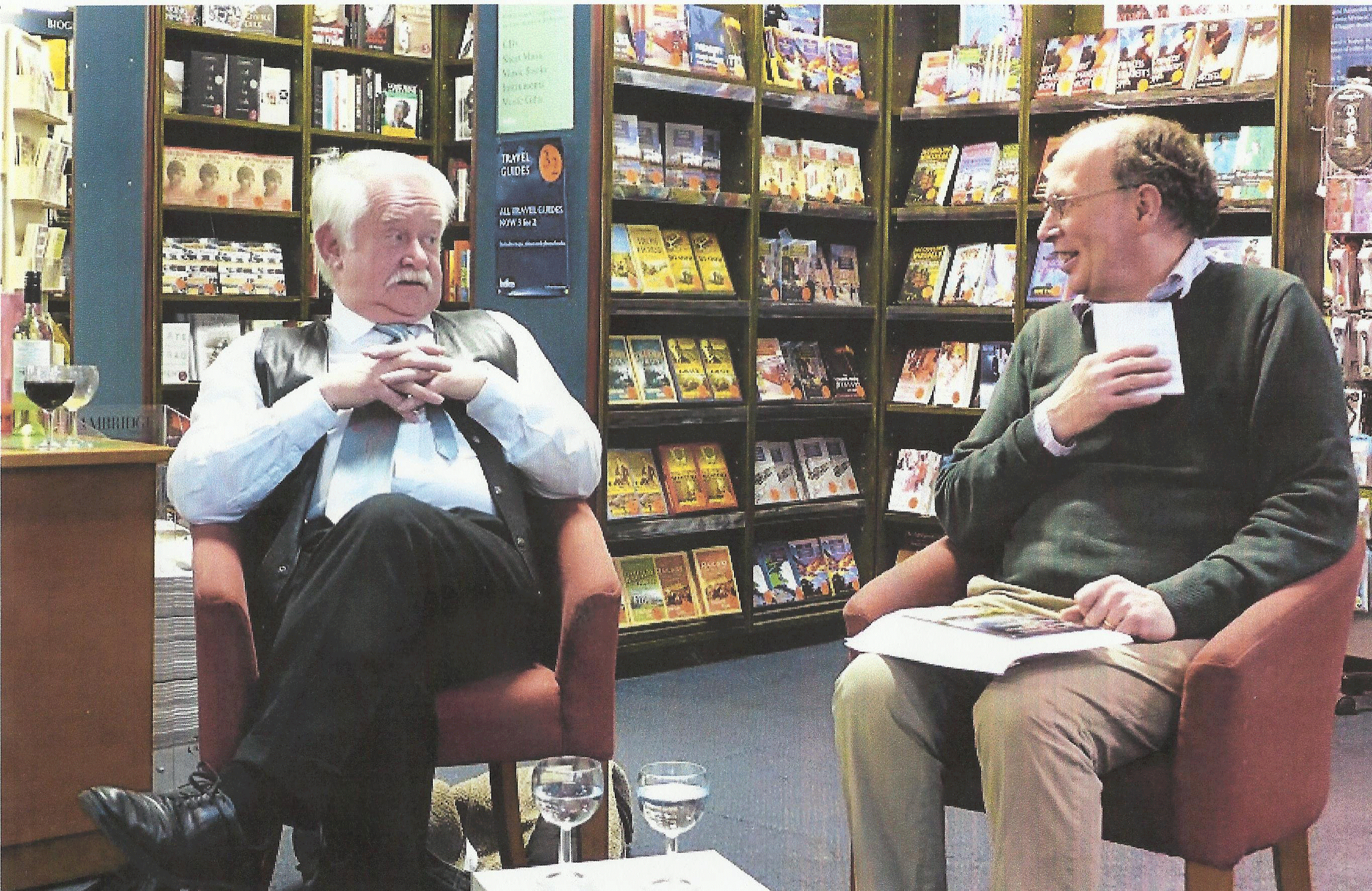
In addition to having to pose alongside a fine display of books I have written or edited, the personal highlight for me was meeting up, after a gap of over 40 years, with the man who first introduced me to the works of Margery Allingham in 1968: Professor Tim Smiley, the former Master of Clare College. [Pictures courtesy of Roger Johnson]
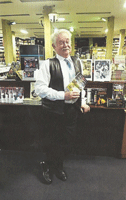 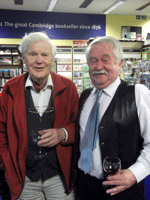
Press Cutting
I was leafing through back copies of the Sunday Express, as one does, when I came upon this little nugget on Graham Lord’s Book Page in the issue dated 8th February 1970. With a couple of redactions, I quote verbatim: Publishers often reject a book that later turns out to be successful. But literary agents do not often refuse to handle a manuscript they think they can sell. So it was pretty depressing for 29-year-old *** ***** when his agent refused – just a year ago – to handle his second novel. Mr ***** decided to get a second opinion. He sent his manuscript to another agent who promptly placed it with a British publisher. He also sold the paperback American and German rights and a film company has offered £10,000 for the book.
The author was, of course, Ted Lewis, and the book his agent refused to handle was Jack’s Return Home which became more famously known as Get Carter or just Carter when the film starring Michael Caine came out and set the bar for British noir.

At the time he wrote it, Lewis was working as an animator in Soho – on, among other things, the Beatles’ Yellow Submarine – but thanks to a switch of agents, Jack’s Return Home was said (by the Express so it must be true) to have earned him £16,000 even before publication. To put that in to context, a pint of beer in 1970 cost around 12p outside London and the average salary was less than £1,700 a year.
Ted Lewis became a full time writer and produced two more Carter books, as well as other hard-nosed crime novels and wrote TV scripts for Z-Cars until his death at the ridiculously young age of 42.
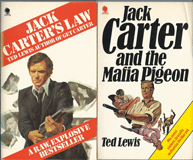
I have no idea who that original agent was, but in switching to a more enlightened one, Ted Lewis was probably following the famous axiom laid down by Raymond Chandler: “With agents, it’s enough that you let them live.”
The Never-Ending Awards Story
It used to be that the Awards season for mystery writing ramped the anticipation and fired the blood in a concentrated flurry of activity usually in the month or so running up to Christmas. I realise I am speaking of the alcohol-dimmed and very distant past, for now it seems hardly a week goes by without an award being dished out or a short-list announced.
With only two months of the year gone, I have already been informed of the Lovey Awards (at the Love Is Murder convention) to be given in seven different categories; the ‘Lefties’ given at the Left Coast Crime convention in Portland in four categories (including, charmingly, one for Best Mystery set in Portland and one for Best Mystery anywhere but Portland); the Hammett Prize, given by I am not quite sure whom; and the ‘Agathas’ given out at the Malice Domestic convention in May in six categories.
It is only in the Agatha short-list that I recognise any authors and their books as Canadian Louise Penny and North Carolina’s favourite Margaret Maron go, once again, head-to-head in the Best Contemporary Mystery category. True, other authors are nominated, but both Ms Penny and Ms Maron are known to me and so I must be careful who I root for (as I believe the expression is) as they both know where I live…
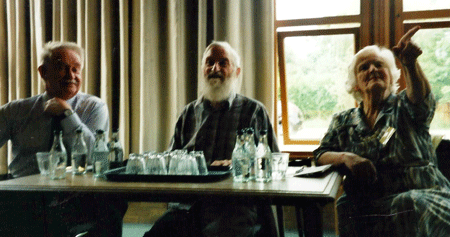
One award with which gives me absolutely no cause of concern, only a feeling of pure joy, is the Crime Writers’ Association’ Diamond Dagger for lifetime achievement which this year will go to the wonderful Catherine Aird, pictured here with the late Harry Keating and myself as we gave a barnstorming seminar on plotting at one of the Cambridge colleges for the Dorothy L. Sayers Society some years ago.
Reliably Unreliable
This column prides itself on being reliably unreliable and so, having gone off on a bit of a rant last month about unreliable narrators in crime fiction, I would now recommend a new novel with six narrators (not necessarily unreliable ones) – seven if you count the omniscient author who fills in bits of crucial back-story.
The Red House, published by Allison & Busby, is the third novel by Emily Winslow, a charming and talented young writer who has the good sense to live in East Anglia but who also happens to be American. Her new novel begins with an obsession about potential incest but is really all about women – some of whom are pregnant, have been pregnant or have faked being pregnant – children adopted or lost, and mothers. None of them come out of the story particularly well; the plot involving manslaughter, a mercy-killing, a suicide attempt, the illegal disposal of two bodies, attempted murder and assault. So, all in all, an everyday story of middle-class Cambridge folk as narrated and seen from the points-of-view of four women and two men. All English.

And here comes the “but” as Emily Winslow is American and writes in a way which comes naturally to her. Now I cannot blame Emily for being American, but her ‘narrators’ are not and when they use expressions such as “high end mall” for a shopping precinct, “crosswalks” for pedestrian crossings and “pastor” instead of priest, then one has to ask why a conscientious editor – any editor – did not suggest vernacular alternatives to smooth over these rather jarring intrusions.
I do not wish to put anyone off and perhaps it is just me still fuming over the loss of our American colonies, as The Red House has much to commend it. As a novel of psychological suspense it certainly delivers and as a portrait of obsessive and damaged women it is perceptive and sympathetic. It should also be commended for its brave attempt at construction its story via multiple narrators. Does it mean I have to vote UKIP if I say I only wished they sounded more English?
Coronation Scot
For some strange reason which I cannot explain, I was aware from a very early age that the orchestral piece ‘Coronation Scot’ may have been inspired by a railway engine but was, far more importantly, the theme tune to long-running radio thriller serials featuring Paul Temple. I say strange as I have absolutely no memory of ever having heard a Paul Temple radio adventure until a very recent revival on Radio 4 last year. I do remember trying to watch the Paul Temple television series starring Francis Matthews which began in 1969, but I have to admit I was not a fan as my taste buds by then had been corrupted by The Avengers, The Prisoner and The Man from UNCLE.
However, I was aware that even though I was not among them, there were millions of Paul Temple fans out there (some 20 million said to be in Germany alone), and that his creator Francis Durbridge was a major influence on crime writing for radio and television for a substantial chunk of the twentieth century.
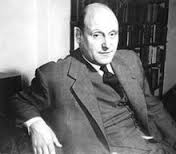 
Although he wrote (or co-wrote) some 38 novels, they were for the most part novelizations of his radio plays, of which Durbridge (1912-1998) was a prolific provider from 1938, when Paul Temple made his debut in the BBC Midland Region and it was in radio that he probably made his greatest contribution to British crime writing. (Though he is conspicuously absent from the Encyclopedia (sic) of British Crime Writing.)
To mark the centenary of Durbridge’s birth, life-long fan and crime fiction bibliophile Melvyn Barnes, O.B.E. began, as a labour of love, to compile an annotated listing not only of Durbridge’s novels, butall his works for radio, television, the stage and cinema. So prolific was Francis Durbridge over a writing career spanning half a century and so diligent in his research was Melvin Barnes, that the result is a paperback book which will surely be the definitive guide to the author’s output and a valuable resource for historians of both the mystery genre and of radio drama, fans of the legendary Paul Temple and, one hopes, the compilers of any future Encyclopaedia (sic).
Privately published by Netherhall Books, Francis Durbridge: A Centenary Appreciation can be obtained by contacting melvyn.barnes@oldnewton.com.
Law and Disorder in Middle Earth
A few years ago I had the honour of being one of the international judges of the Ngaio Marsh Award for best New Zealand crime novel, which was both a pleasurable and educational experience as it involved reading a lot of contemporary Kiwi crime fiction (hardly surprising!). I quickly became aware that all, or almost all, ‘Kiwi crime’ mentions fish-and-chips at least twice and ‘P’ at least once. Fish-and-chips I am of course familiar with and coming from a part of Yorkshire where they still fry using lard, I count myself something of an expert. ‘P’, however, was something of a mystery to me until I consulted the southern Pacific god of knowledge Wai-kik-eep-edia and learned that in New Zealand (though possibly nowhere else), ‘P’ means methamphetamine.
I mention all this in preamble to the publication this month in the UK of Fallout by Paul Thomas [Bitter Lemon Press], which makes mention of fish-and-chips and ‘P’ though only in passing. Not that the reader should need reminding that the setting is New Zealand, as the lead character is a maverick Maori policeman: and what a splendid bruiser of a character Tito Ihaka is!
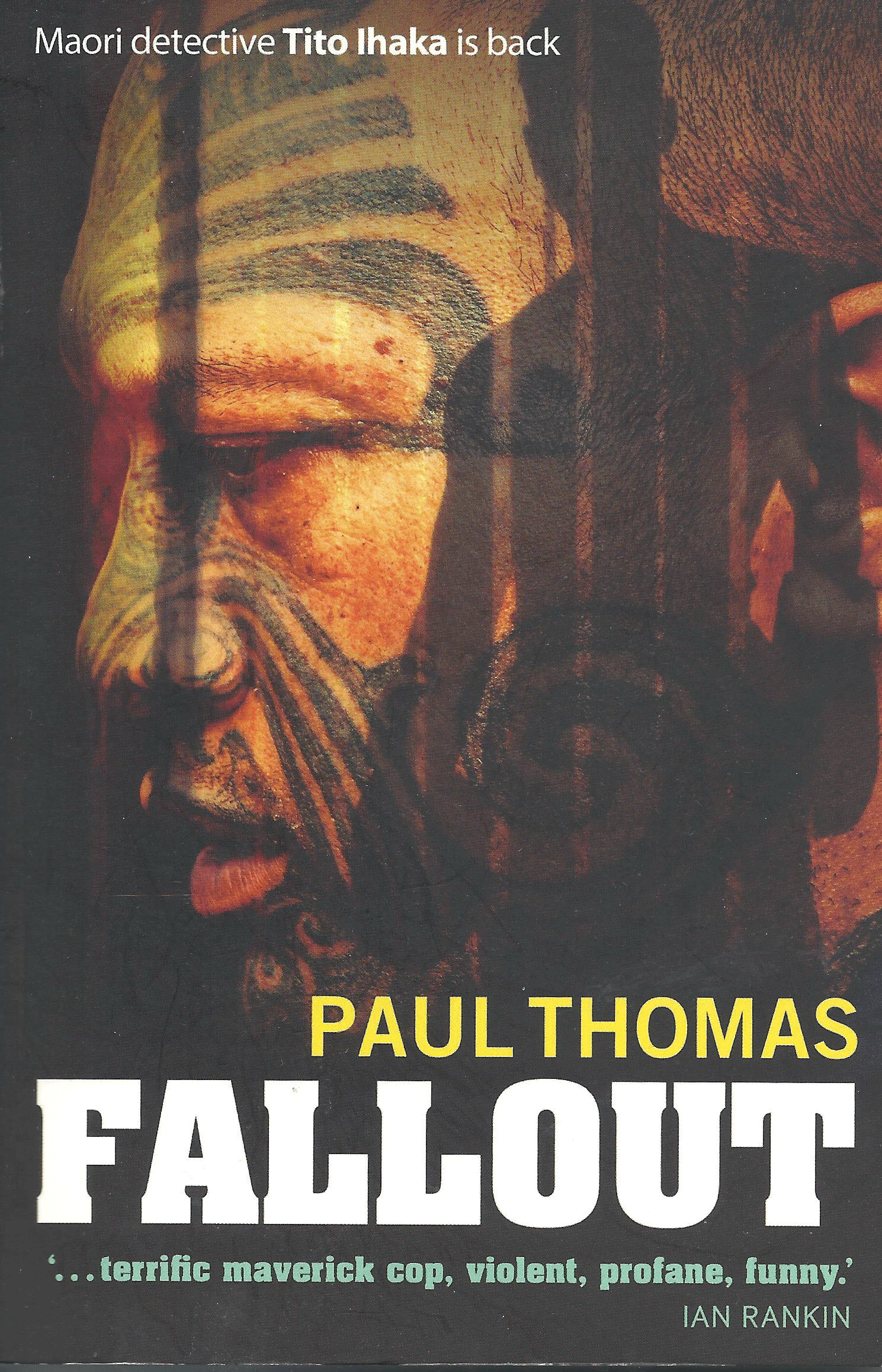
Paul Thomas established his reputation as the Godfather of Kiwi crime-writing with three Ihaka novels in the 1990s and then there was gap until Ihaka reappeared in 2013 in Death on Demand, my favourite mystery of that year and which showed that Thomas was still entitled to the Godfather epithet. What makes Tito Ihaka such a wonderful detective protagonist is that he simply doesn’t care; he doesn’t care who he upsets, either professionally or personally, he doesn’t care who he deals with or how many rules he has to bend or break. In fact once Tito is wound up and pointed in (roughly) the right direction, the best advice for guilty and innocent alike is not to get in his way.
His philosophy is clearly spelled out by Paul Thomas: “(Ihaka) didn’t believe in God, Satan, heaven, hell, previous lives or reincarnation – coming back as a dolphin or a giant of the forest or, for that matter, a sewer rat. He didn’t believe in karma, destiny, extra-sensory perception, UFOs, the Abominable Snowman, elaborate conspiracy theories or the notion that you could be whatever you wanted to be as long as you kept telling yourself you could be whatever you wanted to be. He believed that shit happened. He believed in randomness and coincidence and being in the wrong place at the wrong time. He believed there were bad people out there.”
As fictional policemen go, I equate discovering Tito Ihaka to meeting Reginald Hill’s Andy Dalziel, or Ian Rankin’s John Rebus, or Deon Meyer’s Benny Griessel for the first time. Yes, he’s that good a character.
In Fallout, Ihaka pursues two unsolved ‘cold cases’ – one as a favour to his nominal boss (all bosses are ‘nominal’ as far as Ihaka is concerned) and one which is purely personal, the death of his trade union activist father. In doing so, he manages to upset both poles of New Zealand society: the rich and politically-connected at one end and the die-hard Marxist class warriors at the other (one of whose career bears a suspicious resemblance to that of Arthur Scargill).
Hindered, as usual, by rule-following (i.e. law-abiding) policemen and helped by a corrupt, morally-vacuous ex-cop, Ihaka comes through brilliantly, having reached the conclusion that the best form of justice is that dealt out by himself without a moment’s thought for the consequences.
I am delighted to see that Fallout is on the nine-book longlist for the 2015 Ngaio Marsh Award for crime writing in New Zealand but if Paul Thomas isn’t shortlisted for a CWA Dagger soon, then I think we should send Tito Ihaka round to sort them out.
|
|
Benvenuto

Had I been at all worried about how best to prepare for the upcoming
Chianti Crime Festival in May in Siena, I can now rest easy for surely there
can be no better preparation than to read Death Under A Tuscan Sun by Michele
Giuttari, out this week from Little,Brown.
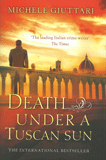
Not only is the title perfect for the Festival (sponsored by the Chianti
producers of Tuscany) but it could hardly have been written by a more
appropriate person as Michele Giuttari – before he turned bestselling author –
was the head of the Florence police force (1995-2003) and is now a special
advisor to the Italian government with a remit to monitor Mafia activity.
Out of Tuscany and down in Campania, I am already enjoying the new
Maurizio De Giovanni novel Viper [Europa], which is the latest
in the Naples born-and-bred author’s ‘Commissario Ricciardi’ series.

The atmospheric Ricciardi books, set in the early 1930s under the
Fascist regime of Mussolini – or ‘old bull head’ as he is referred to by one
character, are the best-known strand of De Giovanni’s writing outside of Italy,
although he is gaining plaudits for another police series set in contemporary
Naples. He also has a third strand of creative writing, about football.
Needless to say his favourite team is Napoli, as I found out when I met him recently on a flying visit to London.
Antiques Roadshow
There is great excitement here in the Eastern Marches at the rumour
that the television series Lovejoy is
to be revived, some twenty years after it regularly pleased more than 9,000,000
faithful viewers in this country as well as many more overseas.

When I joined the scriptwriting team in the early 1990s, the show was
in its fourth season and changes were afoot. Producer Emma Hayter was leaving,
as was the much-loved Phyllis Logan, who played ‘Lady Jane’ and then without
much warning Chris Jury, who played the dim-witted Eric, announced that was
going too. Which left Ian McShane as Lovejoy and Dudley Sutton as his sidekick
Tinker, but such was the dedicated team behind the production (which I think
had 27 scriptwriters all told), that the transition to a fifth series went remarkably smoothly. Caroline Langrishe and Diane Parish (above) joined the
cast as regular replacements for ‘Lady Jane’ and ‘Eric’ and I claim a small
part of the credit for establishing Diane Parish’s character ‘Beth’ (named
after my daughter) in her first episodes.
It is unlikely, of course, that any revival of the Lovejoy franchise will involve the same
cast or production team. It may even be unrecognisable to veteran fans as the
rumour has it that the new producers (the team behind Life on Mars) are planning on going back to the books, as written
by Jonathan Gash, which were more violent, sexist and far less ‘family
friendly’ than the hit television version (very much the vision of Ian McShane)
which spanned the years 1986-94.
Other ‘revivals’ rumoured to be in the television pipeline (or
‘development hell’ as it is known in the business) include another attempt to
bring back Leslie Charteris’ The Saint,
after an American remake (very American
despite cameos for Roger Moore and Ian Ogilvy) in 2013 failed to make the
grade, and the return of Georges Simenon’s famous detective Jules Maigret to be
portrayed by – wait for it – Rowan Atkinson. Despite fears, in some quarters,
that his famous ‘Mr Bean’ persona will result in more Clouseau than Maigret, I
suspect Mr Atkinson will do rather a good job.
Coming Up (rapidly)
Although the shortest month, February has been one of the busiest for
the postman struggling to deliver advance copies of lots of splendid crime
fiction titles rapidly coming up on the publishing horizon this month. I can do
only scant justice to them here in rapid round up.
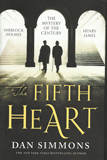
American Dan Simmons has written in numerous genres – science fiction,
fantasy, horror and crime thrillers – and I was mightily impressed with his
2007 novel The Terror about
the doomed 19th century Arctic expedition in search of a ‘north-west
passage’. He stays in the 19th century but this time in America in
1893, for his new novel The Fifth Heart from Sphere, where
he puts Sherlock Holmes no less (a Holmes who has faked his own death at the
Reichenbach Falls) in a detective partnership with novelist Henry James, no
less. The pair find themselves up against a powerfully sinister opponent. Could
it be Moriarty, no less?
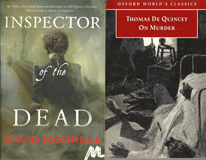
American thriller writer David Morrell is probably still best known
for creating ‘Rambo’ in his 1972 novel First Blood, though he’s probably
sick of hearing that. In his new novel, Inspector of the Dead from
Mullholland, he too uses a 19th century setting, this time Victorian
England at the time of the Crimean War and a plot (there were quite a few) to
kill Queen Victoria herself. For his fictional sleuths he draws on the recently
formed detective branch of Scotland Yard and, controversially, the notorious
Thomas De Quincey and his daughter Emily. ‘Notorious’ for his Confessions of an Opium-Eater, De
Quincey is well-known to students of crime fiction for his 1827 essay On Murder Considered as One of the Fine Arts
and in Morrell’s detailed recreation of Victorian London, he seems a most
likely hero.
There was hardly a dry eye anywhere between Bridgend and Tregaron
when Malcolm Pryce’s series of surreal Welsh thrillers starring Louie Knight
(the best – only – private eye in Aberystwyth) seemed to come to an end in
2011. Pryce, however, is back this month with a new series hero, ‘railway
detective’ Jack Wenlock, in The Case of the Hail Mary Celeste
from Bloomsbury. We are, of course, in Pryce’s personal universe as soon as we
learn that Wenlock is the last of the elite group of detectives known as the
Railway Goslings created at the weeping Cross Railway Servants’ Orphanage –
previous members of the unit having been crushed by an elephant in Indochina,
lost in a Shanghai opium den, dragged from a ship by a giant squid or lost on
the Hindenburg. You get the picture
and it is not a plot spoiler to reveal that Jack Wenlock, ostensibly operating
in 1947 on the eve of nationalisation, gets involved in the legendary mystery
of the disappearance in 1915 of twenty-three nuns from 7.25 to Bristol Temple
Meads… the train which became known as the Hail Mary Celeste – geddit? It is a
book which will hopefully drive train-spotters insane or induce heart attacks
due to excessive laughing. Bridgend and Tregaron
when Malcolm Pryce’s series of surreal Welsh thrillers starring Louie Knight
(the best – only – private eye in Aberystwyth) seemed to come to an end in
2011. Pryce, however, is back this month with a new series hero, ‘railway
detective’ Jack Wenlock, in The Case of the Hail Mary Celeste
from Bloomsbury. We are, of course, in Pryce’s personal universe as soon as we
learn that Wenlock is the last of the elite group of detectives known as the
Railway Goslings created at the weeping Cross Railway Servants’ Orphanage –
previous members of the unit having been crushed by an elephant in Indochina,
lost in a Shanghai opium den, dragged from a ship by a giant squid or lost on
the Hindenburg. You get the picture
and it is not a plot spoiler to reveal that Jack Wenlock, ostensibly operating
in 1947 on the eve of nationalisation, gets involved in the legendary mystery
of the disappearance in 1915 of twenty-three nuns from 7.25 to Bristol Temple
Meads… the train which became known as the Hail Mary Celeste – geddit? It is a
book which will hopefully drive train-spotters insane or induce heart attacks
due to excessive laughing.
John Connolly series hero Charlie Parker – who did survive (just) at the end of last year’s Wolf in Winter – is back
in A
Song of Shadows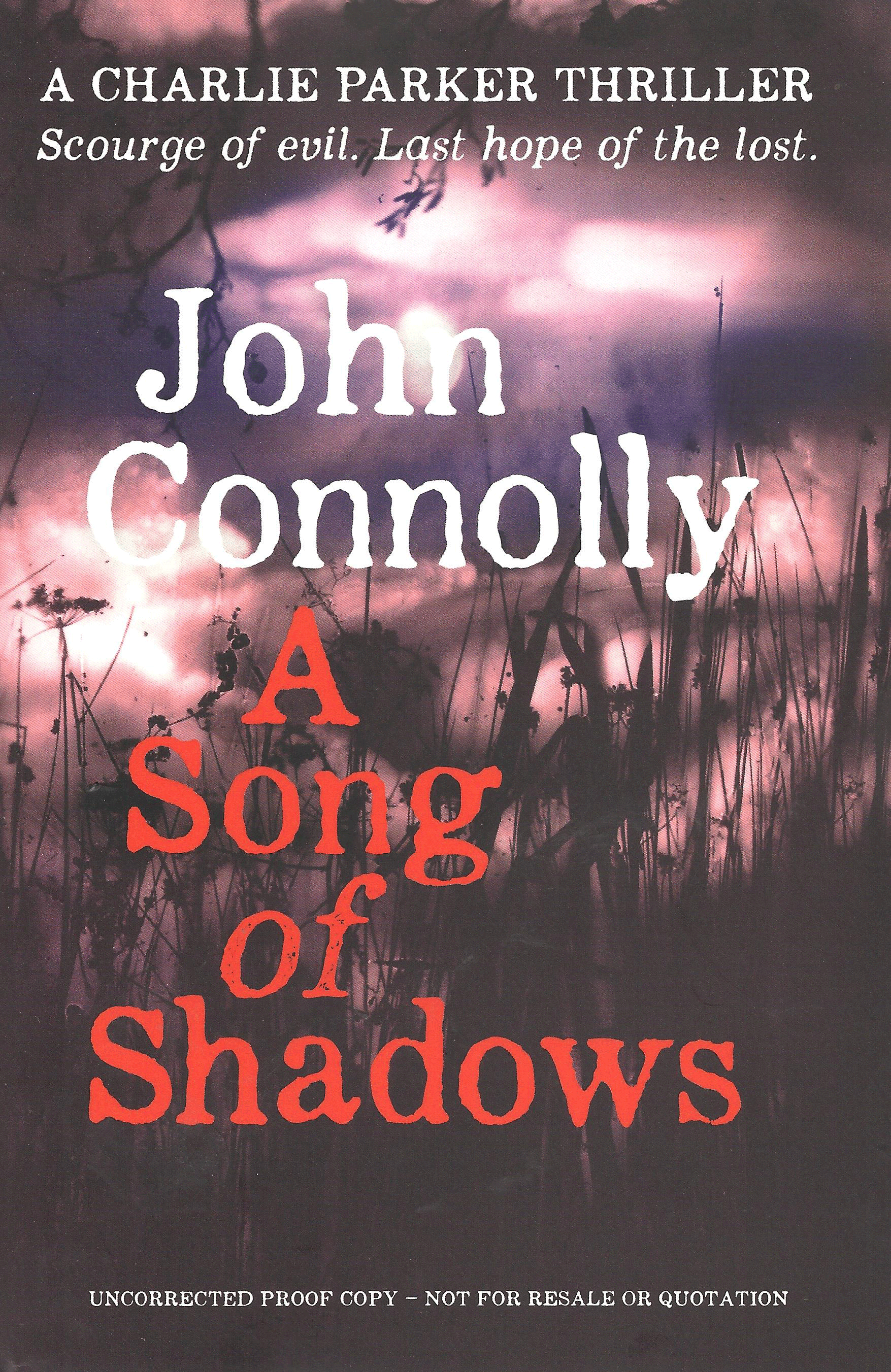 from Hodder. Once again the setting in Maine in the
USA, which Irishman Connolly has made his spiritual home, by which I mean there
are the usual Gothic happenings, psychic dreaming and ruthless violence which
have become his trade mark. The Parker books, shot through with hints of the
supernatural, defy many of the rules of crime writing but do so with such
outrageous brio that belief is
cheerfully suspended. They are, simply put, damnably readable. from Hodder. Once again the setting in Maine in the
USA, which Irishman Connolly has made his spiritual home, by which I mean there
are the usual Gothic happenings, psychic dreaming and ruthless violence which
have become his trade mark. The Parker books, shot through with hints of the
supernatural, defy many of the rules of crime writing but do so with such
outrageous brio that belief is
cheerfully suspended. They are, simply put, damnably readable.
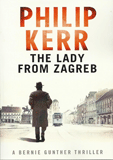
One of my all-time favourite series heroes, Bernie Gunther – who as a
detective in Nazi Germany had some really mean streets to pound – returns in April in The Lady from Zagreb from
Quercus. The year is 1942 and Bernie finds himself working for Josef Goebbels
in Switzerland and Croatia on the trail of a beautiful film star. That’s all
you need to know. Go order a copy now.
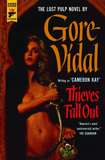
Also coming in April, from Hard Case Crime, is a mystery from one of
my favourite writers of all time, though it is not a book I had ever heard of
and one which the author, if still alive, might not have approved of being
reissued. Nonetheless I am looking forward to Thieves Fall Out by the
late, great Gore Vidal writing as ‘Cameron Kay’. Unlike the crime novels
written as ‘Edgar Box’, this 1953 effort – almost certainly done to solve a
cash flow problem – has not been seen since first publication and some critics
have suggested it ought to stay that way. I, of course, like the great Vidal
himself, have little time for critics…
So Farewell, Then
As I reach the end of my 100th column I can say with all
the honesty that there is not a dry seat in the whole of Ripster Hall, but
before the Shots Editorial Collective
(a right bunch of Bolsheviks) pack me off to the Maximum Security Twilight Home
they have selected, I have been granted the singular honour of perusing the
many hopefuls who have applied to fill my bar stool. Indeed, I have been asked
to feature the top candidates not, I hasten to add, that my opinion counts as
much as a snowflake in a microwave when it comes the actual appointment.
Given my admiration for the rib-tickling humour which spills forth
from almost all Scandinavian crime fiction, I am naturally delighted that so
many applications were received from the Nordic countries although only two
made the short-list.
The face may be gorgeously familiar, but the name is slightly
different and I would go so far as to say that Hilver Ektorp maywell be the dark-horse favourite in this
particular race. She is of course the twin sister of the late, much lamented
Nisse Ektorp, whose posthumously-published Fruit
of the Loom trilogy took the thriller world by storm. Unlike her more
famous sister, Hilver is not a campaigning journalist, explorer, charity
worker, lingerie model, Grand Prix driver or bestselling author. Indeed she has
no published work to her credit, unless you count those ‘special’photograph
albums on The Cloud and one can only guess at what her particular talents are. slightly
different and I would go so far as to say that Hilver Ektorp maywell be the dark-horse favourite in this
particular race. She is of course the twin sister of the late, much lamented
Nisse Ektorp, whose posthumously-published Fruit
of the Loom trilogy took the thriller world by storm. Unlike her more
famous sister, Hilver is not a campaigning journalist, explorer, charity
worker, lingerie model, Grand Prix driver or bestselling author. Indeed she has
no published work to her credit, unless you count those ‘special’photograph
albums on The Cloud and one can only guess at what her particular talents are.
Bøhrs Färrway is already well-known to readers of this column as an authority on
crime fiction committed above the 54th parallel and holds the Chair
of Nordic Nuance at the University of Islington, which makes him a popular
figure on the London crime fiction scene. His ground-breaking study of the use
of darkness and shadows in Scandinavian television drama (Slå de blodige lysine på) remains, sadly, untranslated but he
lectures tirelessly on the subject at the slightest hint of a soused herring. committed above the 54th parallel and holds the Chair
of Nordic Nuance at the University of Islington, which makes him a popular
figure on the London crime fiction scene. His ground-breaking study of the use
of darkness and shadows in Scandinavian television drama (Slå de blodige lysine på) remains, sadly, untranslated but he
lectures tirelessly on the subject at the slightest hint of a soused herring.
Edward Chuzzlewit boasts that he has ‘never read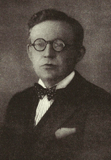 anything after 1945’ as his regular
bedtime is 8 p.m. An expert on the ‘Golden Age’ of crime fiction (and probably
the Stone and Iron Ages as well) he often expresses regret at never having met
any of the authors he has an opinion on. By profession he is an Actuary, having
found Accountancy too exciting, but thanks to a mid-life crisis he has kicked
over the traces and is secretly studying at night school to become a
conveyancing solicitor. anything after 1945’ as his regular
bedtime is 8 p.m. An expert on the ‘Golden Age’ of crime fiction (and probably
the Stone and Iron Ages as well) he often expresses regret at never having met
any of the authors he has an opinion on. By profession he is an Actuary, having
found Accountancy too exciting, but thanks to a mid-life crisis he has kicked
over the traces and is secretly studying at night school to become a
conveyancing solicitor.
When it comes to Waldo
Lydecker I must declare an interest, as Waldo has been my not-always-helpful
Factotum for many years now. Although he has written far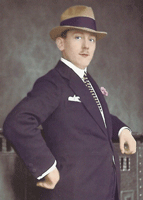 more books than he has
ever read (The Charing Cross Road By
Night [six volumes]; Parties I have
Left Early; Parties I Never Left;
Doormen, Bouncers and Other Bastards;
Soho Square by Dawn’s Early Light; Soho Square by Roxanne’s Nite-Lite; etc.etc.) and claims no affinity with crime fiction at all, other than as
instruction manuals, Waldo is an inveterate party goer. Sociable, gregarious
and with an infinite capacity for Algerian red wine and cheesy nibbles, I
suspect he may be a strong contender. more books than he has
ever read (The Charing Cross Road By
Night [six volumes]; Parties I have
Left Early; Parties I Never Left;
Doormen, Bouncers and Other Bastards;
Soho Square by Dawn’s Early Light; Soho Square by Roxanne’s Nite-Lite; etc.etc.) and claims no affinity with crime fiction at all, other than as
instruction manuals, Waldo is an inveterate party goer. Sociable, gregarious
and with an infinite capacity for Algerian red wine and cheesy nibbles, I
suspect he may be a strong contender.
Once the white smoke has cleared from the chimneys of Shots’ headquarters, I am reliably
informed that my successor will be named in the 1st April column. I
can hardly wait.
Adieu,
The Ripster
|